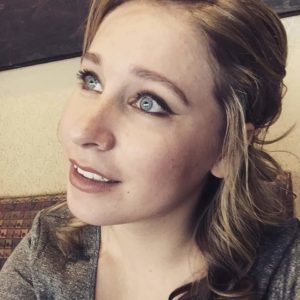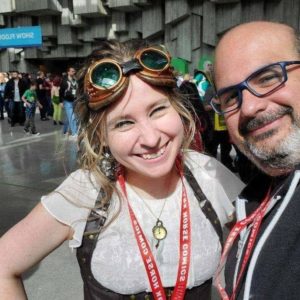By Sadirah Pathan and Olivia Boncic
 When she was learning how to hold a pencil in elementary school, 32-year-old Lauren remembers noticing she had a recurring quirk in which her left hand tried to mimic her right hand. Not knowing what exactly was causing it, Lauren lived the next 20+ years living with this unexplained tendency.
When she was learning how to hold a pencil in elementary school, 32-year-old Lauren remembers noticing she had a recurring quirk in which her left hand tried to mimic her right hand. Not knowing what exactly was causing it, Lauren lived the next 20+ years living with this unexplained tendency.
Around her 30th birthday, Lauren eventually decided to see a doctor to figure this involuntary hand movement after seeing a video on YouTube of a girl with a similar condition. Doctors confirmed that she had congenital mirror movement disorder, and a MRI also showed that Lauren had complete agenesis of the corpus callosum (ACC).
“When I got the news, it was a shock to me but the more I thought about it the more my diagnosis became clear and my symptoms started to make more sense,” Lauren said.
Growing up, Lauren recalls experiencing several situations in which she felt somewhat disconnected from those around her. She remembers questioning why, in certain scenarios, it seemed like no one else was on the same page as her. Friends and family members thought she had attention deficit disorder or autism. Lauren now looks back at those situations with a greater understanding and a possible correlation between them and her recent diagnosis.
“My disorder doesn’t define me, I’m still accepting and coming to terms with it,” said Lauren. “You begin to question if everything wrong is a result of your disorder and then blame everything on that.”
 Throughout her professional life, Lauren has worked with children. After high school she became a camp counselor at the YMCA where her passion for working with kids evolved. Alongside her education in human services with a focus on disabilities, Lauren has worked in various roles advocation for children who have disabilities and those who are in at-risk environments.
Throughout her professional life, Lauren has worked with children. After high school she became a camp counselor at the YMCA where her passion for working with kids evolved. Alongside her education in human services with a focus on disabilities, Lauren has worked in various roles advocation for children who have disabilities and those who are in at-risk environments.
Today, Lauren is back working for the YMCA as a supervisor in the Youth Development Department where many of her students are seeking diagnoses for their conditions. She has been able to relate to them and can now share her story.
“Even with the diagnosis I’m totally fine,” said Lauren. “I always tell those who ask for advice, ‘you’re going to be just fine. We’re in this journey together.’”
Lauren looks forward to continuing to advocate for at-risk students and young people with disabilities.
“I’ve love working with my elementary students. Because of my diagnosis, I get why they aren’t understanding something and that it was okay. We can figure it out together,” Lauren said. “My goal is to help these kids so that they can also help others like I did for them, and it would be like a chain cycle.”
This story is part of the Adults with DCC series that showcases the abilities and lives of real adults living with disorders of the corpus callosum. Students at The University of Texas at Arlington interviewed and wrote stories for this series.

